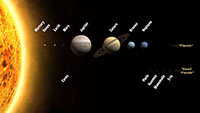Jupiter

The ancients called Jupiter and Saturn “the great chronocrators,” or rulers of time, because the cycles of conjunctions between the two planets subdivide time into large units with observable political and economic cycles.
Saturn, in addition to governing time, rules the government, the constitution and the laws. Saturn rules people who are employed by national, state and local governments. It rules the ability to organize, to crystallize aspirations and to take practical action leading to the fulfillment of long-term goals. It rules tradition, prudence and stability, and land, agriculture and resources. It also rules karma, delays and restrictions. In sum, Saturn is a yang force.
Jupiter is a yin force. In addition to governing space, Jupiter rules the capacity to grow and expand spiritually and materially. It rules optimism, good judgment and honest character; people and places associated with law, religion and education, hence judges and the judiciary; ministers and churches; lawmakers and elected assemblies; and teachers and educational institutions. Jupiter also rules foreign and cultural relations and good fortune.
Saturn is essentially conservative; Jupiter is liberal. Jupiter is a planet that tends to amplify or magnify whatever it touches.
Sources
1988 Pearls of Wisdom, book 1, ch. 5; book 2, ch. 4.
